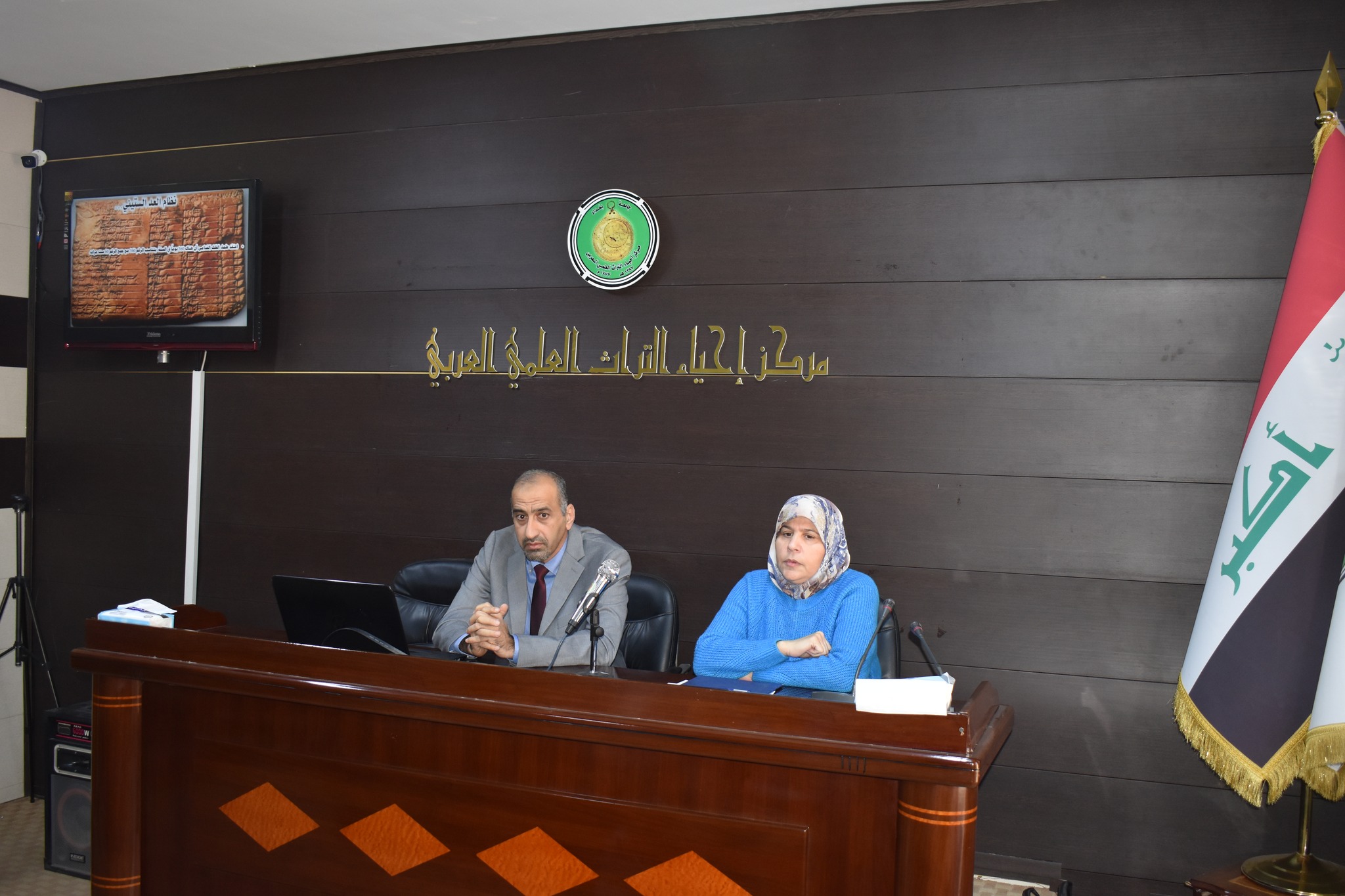مركز احياء التراث العلمي العربي
المخطوطات التي تناولت علم الساعات عند العرب دراسة وتحليل / (The Manuscripts That The study and analysis of horology among the Arabs was discussedحلقة نقاشية
by
→
Asia/Baghdad
قاعه د نبيله (مركز احياء التراث العلمي العربي )
قاعه د نبيله
مركز احياء التراث العلمي العربي
بغداد الجادرية
Description
مركز احياء التراث ينظم حلقة نقاشية
باشراف الاستاذ الدكتورة الاء نافع جاسم مديرة المركز نظم قسم المخطوطات في مركز احياء التراث العلمي العربي / جامعة بغداد صباح يوم الاربعاء الموافق 2024/3/13 وبحضور عدد من الاساتذة والباحثين وعلى قاعة الاستاذة نبيلة عبد المنعم حلقة نقاشية بعنوان (المخطوطات التي تناولت علم الساعات عند العرب دراسة وتحليل ) القى المحاضرة أ.د. عصام محمد علي التدريسي في جامعة بغداد / كلية الهندسة متحدثاً كان للمسلمين دورٌ كبيرٌ في اختراع الساعة الرملية والساعة المائية، لما كان للوقت من أهمية خاصة لديهم وذلك لحاجتهم إلى معرفة أوقات الصلاة ورفع الأذان، ومواقيت الصيام والأعياد والحج، وقد بدأ الأمر قديماً بالساعة المائية البسيطة التي كانت تستخدم في مصر قبل عام 1500 ق.م. والتي كانت تتكون من طاسة اسطوانية مدرجة بأقسام تقيس كمية الماء النازل من ميزاب صغير في أسفلها.
أما الساعات المائية المعقدة فبدأت قصتها منذ القرن الثالث عشر، مع رجل عبقري يدعى إسماعيل بن الرزاز الجزري، من ديار بكر في جنوب شرق تركيا، كان مسلماً تقيا ومهندساً بارعاً، وبحلول عام 1206م كان الجزري قد صمم وصنع ساعات كثيرة من مختلف الأشكال والأحجام، وقد ألف كتابا في الهندسة الميكانيكية عنوانه "الجامع بين العلم والعمل النافع في صناعة الحيل" ورَدَ فيه وصف لخمسين جهازاً ألياً موزعة على ست فئات بما فيها الساعات المائية.
وقد ظهرت إبداعات العرب في علم الساعات في زمنٍ مبكر؛ ففي عام (192هـ=807م) أهدى هارون الرشيد (ت 193هـ) ساعة دقَّاقة معقَّدة إلى شارلمان (ت 814م) ملك الفرنجة، كما أبدع عبَّاس بن فرناس (ت 274هـ) ساعةً سمَّاها "الميقات" أهداها إلى الأمير محمد بن عبد الرحمن في منتصف القرن الثالث الهجري، وأرفقها بأبيات شعريَّة يصف فيها أهميَّة اختراعه وفوائده.
Under the supervision of Professor Dr. Alaa Nafi Jassim, Director of the Center, the Manuscripts Department at the Center for the Revival of Arab Scientific Heritage / University of Baghdad organized a discussion session on Wednesday morning, corresponding to 3/13/2024, in the presence of a number of professors and researchers, and in the hall of Professor Nabila Abdel Moneim, a discussion panel entitled (The Manuscripts That The study and analysis of horology among the Arabs was discussed (the lecture was given by Prof. Dr. Issam Muhammad Ali, a lecturer at the University of Baghdad / College of Engineering, speaking. Muslims had a major role in the invention of the hourglass and the water clock, because time was of special importance to them, due to their need to know the times of prayer and the call to prayer, and the times of fasting, holidays, and Hajj. The matter began. In the past, with the simple water clock that was used in Egypt before 1500 BC. It consisted of a cylindrical bowl with sections to measure the amount of water coming down from a small gutter at the bottom. As for the complex water clocks, their story began in the thirteenth century, with a genius man called Ismail bin al-Razzaz al-Jazari, from Diyarbakir in southeastern Turkey. He was a pious Muslim and a brilliant engineer, and by the year 1206 AD, al-Jazari had designed and manufactured many clocks of various types. Shapes and sizes. He wrote a book on mechanical engineering entitled “Combining Science and Useful Work in the Making of Tricks,” in which he described fifty automatic devices distributed into six categories, including water clocks. Arab innovations in horology appeared at an early age. In the year (192 AH = 807 AD), Harun al-Rashid (d. 193 AH) presented a complex minute watch to Charlemagne (d. 814 AD), King of the Franks. Just as Abbas bin Firnas (d. 274 AH) created a clock he called “The Miqat,” which he presented to Prince Muhammad bin Abdul Rahman in the middle of the third century AH, and accompanied it with poetic verses describing the importance of his invention and its benefits.

Organised by
حلقه نقاشية
د زينب كامل


